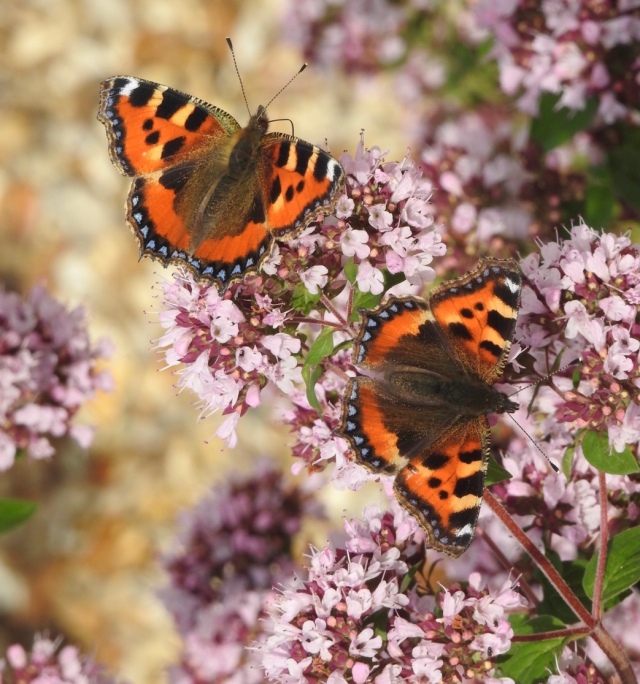A guest blog by Dr Carly Butler, Researcher in Nature Connectedness, University of Derby.
Everyday noticing and appreciation of the more-than-human world is vital for developing a sense of nature connectedness. Yet, a 2020 study by University of Derby and the National Trust found that in the United Kingdom, people often don’t pay attention to nature, with nearly two-thirds of people reporting that they rarely or never listen to bird song or watch butterflies. These findings reflect (and may partially explain) the low levels of nature connectedness in the UK. They are worrying as these simple ways of engaging with nature are so important in the growth of closer relationships with nature, which in turn are vital for the wellbeing of both people and planet. People with a stronger sense of nature connectedness are more likely to feel happy, satisfied with life, and to take action to help nature. A culture in which people don’t notice butterflies is not well-resourced to deal with the meta-crisis. As discussed in a previous blog post on the ‘butterfly affect’, small acts of noticing can potentially have big impacts.
Past research from the Nature Connectedness Research Group has found that taking part in citizen-science activities, like counting pollinators or birds, leads to increased nature connectedness and wellbeing. The impact of taking part was boosted by experimental manipulations of people’s noticing and appreciation of nature – by noticing three good things in nature, or rating birds for feelings of joy they invoked. These studies demonstrated the value of citizen science activities extend beyond the contributions to conservation – they can benefit humans themselves and improve the human-nature relationship.
Our latest paper, just published in Biological Conservation, reports on a collaboration with Butterfly Conservation that looked at the impact of a real-world citizen science project. The annual Big Butterfly Count is one of the world’s largest nature-based citizen science projects, in which more than 60,000 people spend fifteen minutes on a sunny day to count and record how many butterfly species they see during that time. In 2022, people who signed up for the Big Butterfly Count were also invited to take part in our research. Those who took part completed a survey before and after the Big Butterfly Count period (N=382), and then again at follow-up a few weeks later (N=345), which explored whether the simple act of watching and counting butterflies had an effect on nature connectedness, wellbeing and people’s tendency to notice nature and butterflies.
We found that after taking part in the Big Butterfly Count, nature connectedness was increased, people were more likely to notice butterflies and other nature, and anxiety was decreased by nearly ten percent. At follow-up we found increased wellbeing and butterfly noticing. The impact of taking part was greater when people experienced stronger emotions during the count – the more joy, compassion, interest, and fascination they felt, the greater the increase in nature connectedness and noticing.
Participants were also invited to comment on their experience of taking part in the count. Many reported feelings of joy, wonder, and calm and shared the pleasure they received from watching the butterflies in a focused and sustained way. There were also many reports of feelings of sadness and concern, particularly when seeing few butterflies to count, and comparing their count to previous years. However, these feelings often motivated ongoing and renewed actions for nature – commitment to continue taking part in the count, and planting for pollinators.
The research shows that a real-world citizen science project designed primarily to gather scientific data and raise awareness of butterfly conservation can also improve people’s wellbeing and relationship with nature. Beyond that, it reminds us that counting butterflies is not just a matter of counting butterflies – it is an emotional engagement with the more-than-human world, an opportunity for close focused attention toward nature, and an invitation to tune into the beauty and wonder of these magnificent flying creatures. Such moments with nature renew our relationships with the wider living world, helping us feel closer to and more a part of nature. These reminders of our connections with, and appreciation for, the more-than-human have never been more necessary.
The time we spend helping nature by contributing to the monitoring of its health and vitality, is time that also helps our own health and vitality. Conservation and regenerative activities are perhaps as important for humans as they are for nature, with the potential to encourage a cycle of noticing and connection and care. The wellbeing and nature connection benefits of citizen science deserve to be more widely recognised and developed through integrated nature and health initiatives – bringing wildlife monitoring into green social prescribing for example, and championing the wellbeing benefits of counting wildlife. With Local Nature Recovery Strategies developing around the country, it’s important that communities are involved in supporting and monitoring that recovery. A system that values nature and people will support spaces where plants for pollinators can thrive, and where people can watch the pollinators so that they too can thrive, while helping to monitor the health of the more-than-human world.
Citizen science offers fantastic opportunities for people to contribute to scientific research, and to develop their knowledge and skills. Our research highlights the additional benefits of such projects – their invitations for communities to notice nature, to gift their attention to the more-than-human and to recognise, cherish, and deepen their emotional connection to nature. One butterfly at a time.
C.W. Butler, I. Hamlin, M. Richardson, M. Lowe, R. Fox (2024). Connection for conservation: The impact of counting butterflies on nature connectedness and wellbeing in citizen scientists,
Biological Conservation, 110497.

